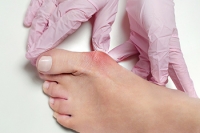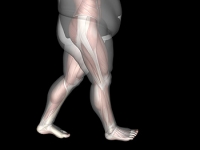 Sweaty feet can be a temporary problem caused by having your feet enclosed in shoes and socks all day, or from high temperatures. But if having sweaty feet is an everyday occurrence, the chances are that you have a condition known as hyperhidrosis. This condition is thought to be genetic in nature. Some people are born with overactive sweat glands, and the moisture produced goes well beyond sweating from hot weather, exercising, or stress. Several underlying health conditions and certain foods may also cause hyperhidrosis. In some cases of hyperhidrosis bacteria forms around the feet causing them to emit a foul odor. It is a good idea to use antibacterial soap regularly to keep the feet clean and healthy. Wearing moisture-wicking socks or open-toed shoes or sandals is a good way to keep your feet dry. A podiatrist can offer more advanced treatment options, including several prescribed antiperspirant medications. In extreme cases, surgery to block the nerve passageway that tells the feet to sweat can be performed. For more information, please contact a podiatrist.
Sweaty feet can be a temporary problem caused by having your feet enclosed in shoes and socks all day, or from high temperatures. But if having sweaty feet is an everyday occurrence, the chances are that you have a condition known as hyperhidrosis. This condition is thought to be genetic in nature. Some people are born with overactive sweat glands, and the moisture produced goes well beyond sweating from hot weather, exercising, or stress. Several underlying health conditions and certain foods may also cause hyperhidrosis. In some cases of hyperhidrosis bacteria forms around the feet causing them to emit a foul odor. It is a good idea to use antibacterial soap regularly to keep the feet clean and healthy. Wearing moisture-wicking socks or open-toed shoes or sandals is a good way to keep your feet dry. A podiatrist can offer more advanced treatment options, including several prescribed antiperspirant medications. In extreme cases, surgery to block the nerve passageway that tells the feet to sweat can be performed. For more information, please contact a podiatrist.
If you are suffering from hyperhidrosis contact Brent Harwood, DPM from Southeast Podiatry. Our doctor can provide the care you need to attend to all of your podiatric needs.
Hyperhidrosis of the Feet
Hyperhidrosis is a rare disorder that can cause people to have excessive sweating on their feet. This can usually occur all on its own without rigorous activity involved. People who suffer from hyperhidrosis may also experience sweaty palms.
Although it is said that sweating is a healthy process meant to cool down the body temperature and maintain a proper internal temperature, hyperhidrosis may prove to be a huge hindrance to a person’s everyday life.
Plantar hyperhidrosis is considered to be the main form of hyperhidrosis. Secondary hyperhidrosis can refer to sweating that occurs in areas other than the feet or hands and armpits. Often this may be a sign of it being related to another medical condition such as menopause, hyperthyroidism, or even Parkinson’s disease.
In order to alleviate this condition, it is important to see your podiatrist so that they may prescribe the necessary medications so that you can begin to live a normal life again. If this is left untreated, it is said that it will persist throughout an individual’s life.
A last resort approach would be surgery, but it is best to speak with your podiatrist to find out what may be the best treatment for you.
If you have any questions please feel free to contact our offices located in Fairhope, Brewton, and Atmore, AL. We offer the newest diagnostic and treatment technologies for all your podiatric needs.








